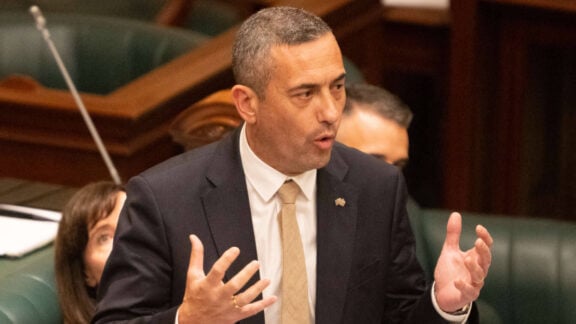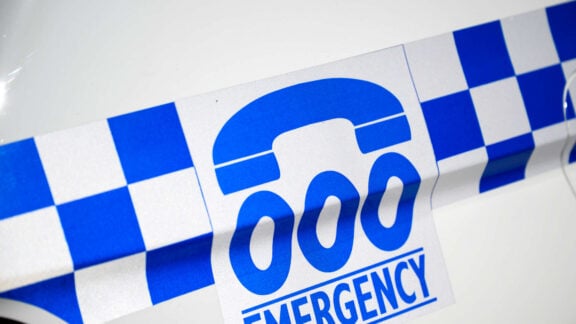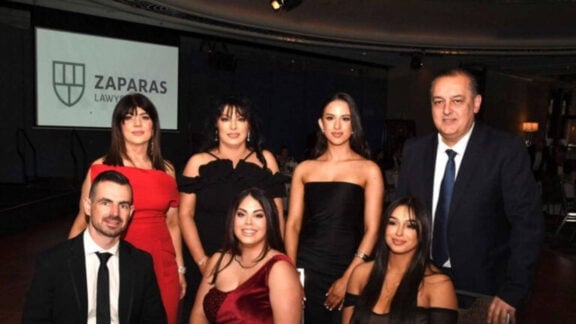A motion to recognise the Genocide of Armenians, Assyrians and Greeks carried out the Ottoman and irregular forces during World War I, is expected to be tabled in the Victorian Parliament soon by Victorian Greens leader, Samantha Ratnam. The Greens leader is a candidate for the Hellenic-heavy seat of Wills now held by Labor’s Peter Khalil.
Neos Kosmos understands that the proposed motion has activated Turkish-Australian advocates, including Turkish heritage Labor parliamentarians, and party members and some organisations, to call on the Victorian government and the opposition to reject the motion.
It is widely agreed that genocides perpetrated by the Ottoman Empire resulted in the deaths of over two million Christians indigenous to Asia Minor. Around 1.5 million Armenians,300,000 Assyrians and 250,000 Greeks perished in death marches, massacres, and forced starvation. Despite international recognition of these events as genocide Turkey has denied the classification since 1923. Currently 34 nations recognise the genocides including, the United States, France, Germany, Argentina, Brazil, Canada, Greece, Italy, Mexico, the Netherlands, Poland, Portugal, and Sweden.
Social media posts opposing the motion described it as “anti-Turkish and anti-Muslim hatred”, and accuse Ratnam of “political opportunism” and “distorting history”. They call the motion “divisive” and an attempt by Ratnam to garner favour from the Greeks. Former Victorian Labor minister and the president of the Cyprus Community of Melbourne Victoria, Theo Theophanous does not see the motion as “anti-Turkish or anti-Muslim”.
He told Neos Kosmos that acknowledging the Greek, Armenian and Assyrian genocides of 1915–1923 “is not anti-Turkish as some claim.” The former Labor politician called the recognition of the genocides as something “above party politics.”
“Recognition of the genocides is a necessary foundation for reconciliation between peoples by bringing the affected communities together to share their stories of suffering and move toward a future of understanding as we have done with our indigenous communities,” Theophanous said.
Neos Kosmos has received reports that Turkish-Australian members of the Labor Party and other Turkish representatives in Victoria’s parliament are lobbying Labor and the Liberal party to oppose the motion. According to these sources, the two major parties are trying to gauge responses from Greek, Armenian and Assyrian communities before announcing their intent. So, leaders in the Armenian, Assyrian community are calling for ” a public outcry from the Armenian, Assyrian and large Greek communities”.to ensure the motion’s “success”.
Several Greek diaspora organisations and their allies, have sent letters to the Victorian Government and the opposition, urging MPs to support the motion. A Liberal MP, they said, responded, “I believe it is critical to acknowledge this to honour the victims, survivors and their descendants, and to ensure that it never happens again.”
“The future of this recognition depends on the response from both political figures and the Greek, Armenian, and Assyrian communities.”
Leaders from the Assyrian and Armenian community reminded Neos Kosmos that Labor and Liberal MPs attended the Genocide Commemorations in 2024. “Our calls are clear, we expect them to vote in support of the motion,” they said.
The government and opposition have not formally commented on the proposed motion by Ratnam. To influence both sides of parliament, Armenian and Assyrian leaders told Neos Kosmos that Greeks need to apply pressure. “A significant public outcry from the Greek and other communities is needed to ensure the motion’s success.”
The New South Wales, South Australian and Tasmanian parliaments have all acknowledged the genocides and advocates are calling on their communities to “apply moral pressure” on Victorian parliamentarians to follow suit.
In the United States, Massachusetts, Michigan, Rhode Island, and California now include the teaching of these genocides in school curricula, along with the 1922 Smyrna disaster. Since 2020, the Joint Justice, led by figures from the Armenian, Assyrian, and Greek communities or Australia, has advocated for commonwealth recognition of the genocides.
Earlier this year, the Joint Justice Initiative succeeded in having the genocides included in educational materials by the NSW Education Standards Authority. Pupils can now also learn about humanitarian efforts in World War I, by Australians and New Zealanders who rescued survivors from the horrors – the systematic attempt to eradicate of Turkey’s Christian populations.
Joint Justice and key advocates for the motion said, “The future of this recognition depends on the response from both political figures and the Greek, Armenian, and Assyrian communities.”









